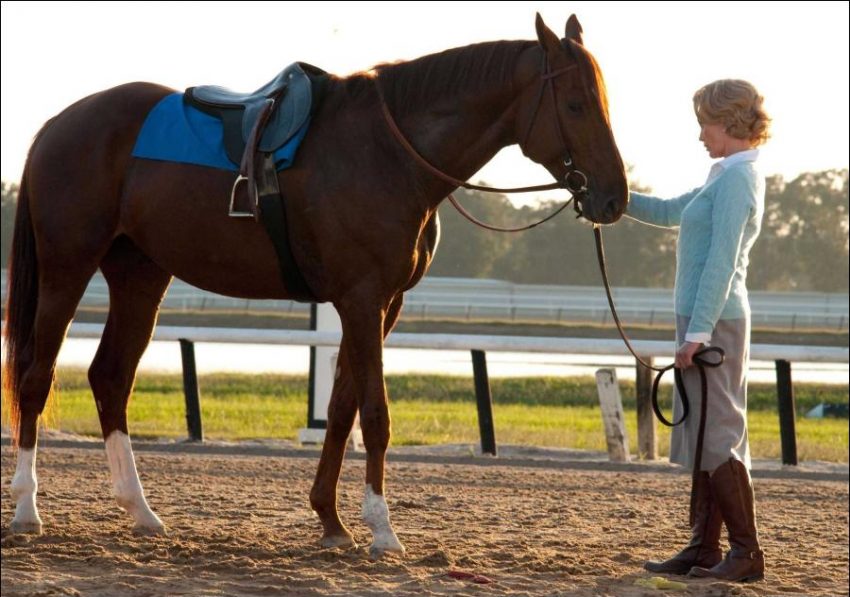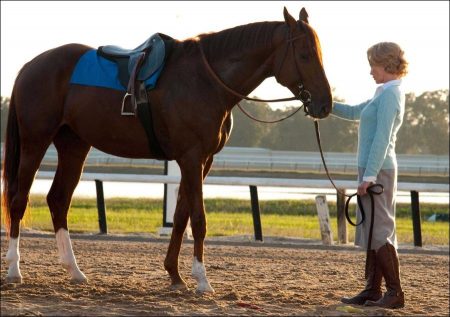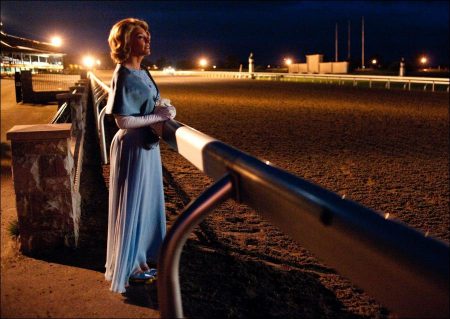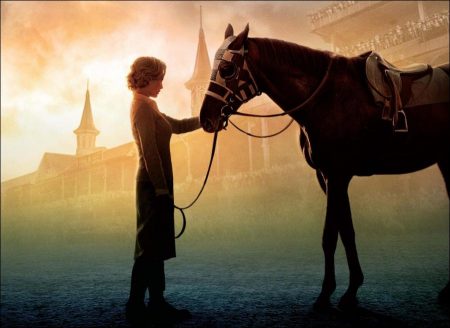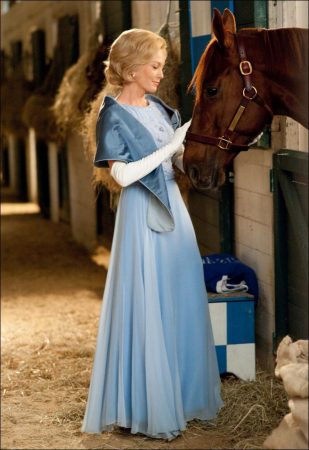Taglines: The impossible true story.
Chenery was a mother and housewife who knew little about horses when she was pressed to take over her ailing father’s horse farm in Virginia. Though Secretariat came along and began to take shape as a potential champion, Chenery was pressured to sell the farm after her father died and she was hit with a multimillion-dollar inheritance tax.
She saved both the farm and the horse, and watched as Secretariat became the first thoroughbred to win the Triple Crown in 25 years, taking the Kentucky Derby, Preakness and Belmont Stakes in dominating fashion. Chenery became known as the “first lady of racing.”
Based on the remarkable true story, Secretariat chronicles the spectacular journey of the 1973 Triple Crown winner. Housewife and mother Penny Chenery (Diane Lane) agrees to take over her ailing father’s Virginia-based Meadow Stables, despite her lack of horse-racing knowledge.
Against all odds, Chenery—with the help of veteran trainer Lucien Laurin (John Malkovich)—manages to navigate the male-dominated business, ultimately fostering the first Triple Crown winner in 25 years and what may be the greatest racehorse of all time.
Known as a “superhorse,” Secretariat captured the imagination of people around the world — not just horse-racing enthusiasts; his powers transcended anything that had been seen before, winning the holy grail of racing, the Triple Crown, in heart-pounding fashion. A triumvirate of races open only to 3-year-old horses, the Triple Crown begins with the famed Kentucky Derby, a 1 1/4-mile “Run for the Roses.” The “middle jewel” in the Crown is the 1 3/16-mile Preakness Stakes, the “final jewel,” the 1 1/2-mile Belmont Stakes. Secretariat didn’t make it easy on himself.
He lost the Wood Memorial, the last big race before the Kentucky Derby, causing supporters and detractors to doubt his prospects. He took the lead at the Kentucky Derby and the Preakness only after running dead last for most of those contests. Finally, at Belmont, he literally hit his stride, winning by a record-pulverizing 31 lengths.
“ESPN compiled a list of the 100 top athletes of the 20th century and Secretariat was 35th — and the only non-human on that list,” says producer Mark Ciardi. “That’s how unbelievable his presence was. What makes it really interesting is going underneath that story. We knew we had the ending, but not many people know about Penny’s story, and that was incredibly compelling to us.”
Ciardi and producer Gordon Gray, who collectively form Mayhem Pictures, have a history of chronicling iconic and uplifting sports events in movies, from “The Rookie” to “Miracle” and “Invincible.” “Secretariat” began when screenwriter Mike Rich, who wrote “The Rookie” and “Miracle,” approached Mayhem about the legendary thoroughbred.
“He is a big fan of horse racing, and he approached us with the idea of doing a film about Big Red, and of course, we loved the story and thought it was a great idea,” Ciardi says. “Mike felt like he had found a way in, which was through Penny’s story. Sports movies typically follow the journey of an underdog, but with Secretariat, on the surface, that element didn’t exist as much, though certainly the horse had some issues to overcome to win the Triple Crown. But, really, it’s her story as much as the horse’s, and she definitely had to overcome steep odds to succeed.”
Of course, in order to bring the tale to the big screen, Ciardi and Gray needed Chenery’s blessing. Known as The First Lady of Horse Racing, Chenery had been approached before and she had turned them all down. “Many, many people approached Penny and tried to make this story, but she held on to her rights for a long time. We got very lucky. She liked Disney and the team we put together. And she was very involved in the movie, from the early conversations through production. To have her be a part of it was very important to us, and she was tremendously excited about it.” — Mark Ciardi, Producer
Chenery was so supportive, in fact, that she agreed to be an extra in the film during the scene in which Secretariat wins the Kentucky Derby, filmed at Churchill Downs. The producers turned to director Randall Wallace to tackle the film’s mixed bag of action and emotion. “We feel very fortunate that we got in Randy, not only a fantastic director who only does projects he is very passionate about but also an A-plus screenwriter. I mean, he wrote ‘Braveheart.’ His clear, real enthusiasm for this story was evident from the start and only increased throughout production,” Ciardi says.
The fact that Secretariat’s story began with a coin toss is extraordinary enough. But the real irony is that the woman who became the owner of the world’s greatest racehorse actually lost the fabled flip. Lucky for her. Christopher Chenery had struck a deal with Ogden Phipps, the preeminent, wealthy horse owner and breeder.
A coin toss would determine who’d get first pick of two foals produced by Phipps’ stallion Bold Ruler and Chenery’s mares Hasty Matilda and Somethingroyal. By the time of the all-important toss, Penny Chenery was in charge. Phipps won the toss, making what most deemed the obvious choice, leaving Chenery with the yet-unborn horse that would become Secretariat. She’d had her eye on that foal all along, and time would prove her right.
Finding the Emotion
“What was so brilliant [about the movie] was the portrayal of the real people, the hope and humor we had on this adventure with this amazing horse. I feel like everyone involved told our story with warmth and intelligence.” — Penny Chenery
It was the emotional core of Penny and Secretariat’s story that attracted Wallace. And there was definitely a richness of emotional terrain to plumb. “Horses speak to our primal nature,” says the director. “When all is said and done, this is a story about a tremendous horse. But, beyond that, I wanted to understand and experience the way this unique animal had affected people who themselves were special. All my life, I have been intrigued by the mechanism and the moment of transformation: What happens when what we call a miracle occurs? What happens when someone, in this case a horse, does something that no one else has ever done or that they themselves have never done? What happens when someone stops doubting and starts believing? And this story is full of those moments.”
Specifically, he adds, Penny Chenery undergoes a remarkable transformation that is just as magnificent, bold and inspirational as her horse Secretariat’s. “What’s at stake in the story of Secretariat is something that is fundamental to everybody. Destiny comes knocking on the door of Penny Tweedy. She had given up her dreams of a career. She had become a mother of four, a wife, a prominent member of her community.
But when her father becomes ill and her mother dies, destiny knocks on her door and says, ‘Penny, here is an opportunity to do something.’ And it was something that nobody else believed that she could do. That was something else that inspired me about this tale — that time and again, she is told that she can’t do this, that this isn’t her identity, that she’s a housewife. And she keeps reinventing herself, tackling issues in a manner that allows her to make her way in what was a man’s world at the time. She’s a mastermind financially, but most of all, she’s a leader,” Wallace says.
Chenery demurs. “It didn’t occur to me that I was a woman in a man’s field. I just thought I had the best horse,” she says. Indeed, Chenery was more prepared than most women in the 1970s to take over the family business and step into the Byzantine world of horse racing. She attended Smith College and graduated with a Bachelor of Arts, but it was her father who encouraged her to continue her education — and not just for learning’s sake.
“I had been brought up as part of a family that was meant to take over Dad’s business, and I was equipped to do it,” says Chenery. “After college, I wasn’t married and wasn’t working in the horse business and my father said, ‘Well, you need to go to school and learn something that will help you get a job.’ I went to the Graduate School of Business Administration at Columbia. You really have to have a product you believe in and the resolve that you can do it. I worked very hard and was very determined — and I didn’t really look at what the men thought of it.”
“Secretariat” brings that spirit to the big screen, showcasing the power of the human (and animal) spirit. But according to Wallace, “Secretariat” has an even greater significance. “I think this movie is about transcendence, about people and animals achieving more than anyone thought possible,” he says. “It has an inspiring theme and story — it’s the powerful story of a horse and a woman who did what no one believed could be done. And it reminds us of the miracle of life, how life is bigger than we believe it can be.”
Secretariat (2010)
Directed by: Randall Wallace
Starring: Diane Lane, John Malkovich, Scott Glenn, James Cromwell, Dylan Walsh, Margo Martindale, Otto Thorwarth, Sonya Delormier, Nestor Serrano, Carissa Capobianco, AJ Michalka, Jacob Rhodes
Screenplay by: Mike Rich, William Nack
Production Design by: Donald Dowd, Thomas E. Sanders
Cinematography by: Dean Semler
Film Editing by: John Wright
Costume Design by: Michael T. Boyd
Set Decoration by: Patrick Cassidy
Art Direction by: Sarah Boardman, Naaman Marshall
Music by: Nick Glennie-Smith
MPAA Rating: PG for brief mild language.
Distributed by: Buena Vista Pictures
Release Date: October 8, 2010
